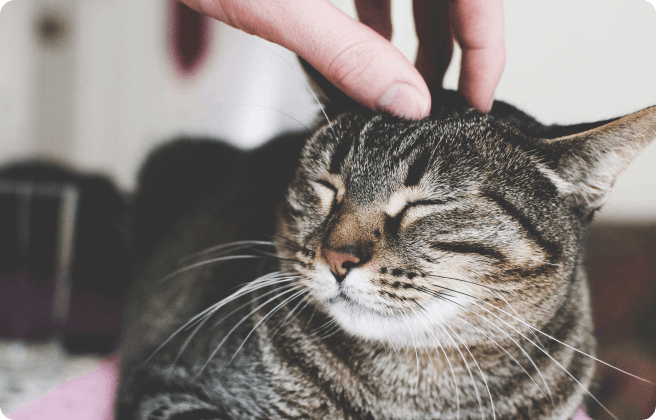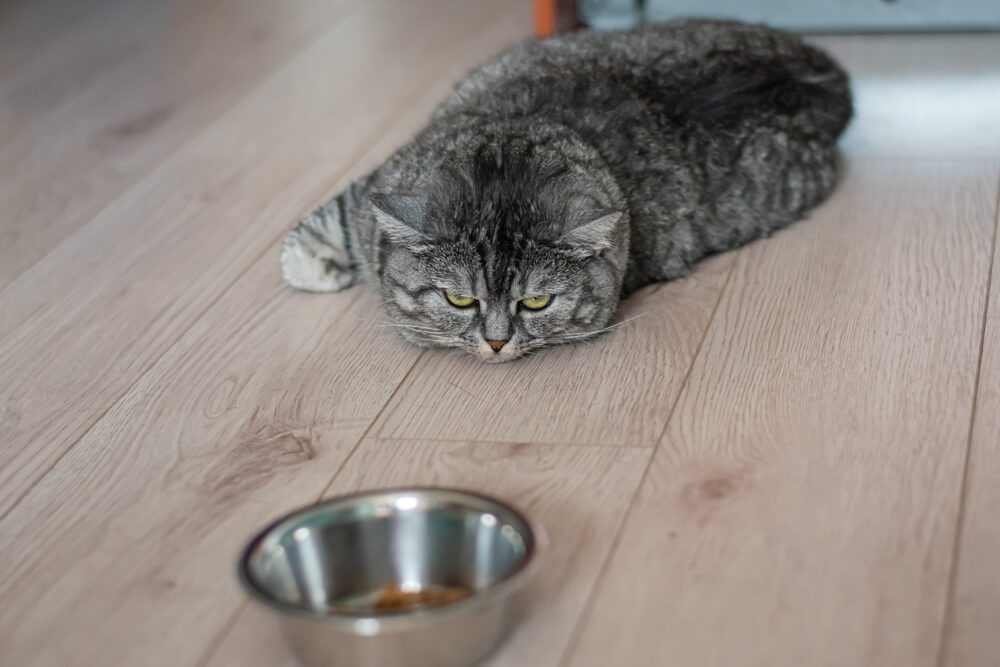
Just as in humans, there’s a huge list of things to which cats can be allergic. Getting to the root of your cat’s allergies requires a bit of detective work, aided by assistance from your vet who will be able to suggest environmental changes, offer anti-allergy medication and even run tests to possibly find the offending irritant.
What are the symptoms of allergies in cats?
Your cat’s immune system can be set off by allergens and the symptoms are often quite similar to those seen in humans.
Here are some common symptoms of allergies in cats:
- Skin irritation and itching: One of the primary signs of allergies in cats is excessive itching and scratching. Cats may bite, lick, or scratch themselves excessively, leading to hair loss, redness, scabs, or sores on the skin.
- Gastrointestinal issues: Allergies can cause digestive problems in cats. Symptoms may include vomiting, diarrhea, increased frequency of bowel movements, or changes in stool consistency.
- Respiratory symptoms: Cats with respiratory allergies may experience sneezing, coughing, wheezing, or nasal discharge. These symptoms may be more common in cases of environmental allergens, such as pollen or dust mites.
- Swelling and inflammation: Allergic reactions can cause swelling or inflammation in various areas of the body. This can include facial swelling, swollen paws, or hives (raised, itchy bumps on the skin).
- Ear infections: Allergies can contribute to ear problems in cats, including recurrent ear infections. Cats may show signs of ear discomfort, head shaking, scratching at the ears, or excessive earwax buildup.
- Eye problems: Cats with allergies may develop red, itchy, or watery eyes. They may also rub their eyes or have increased tear staining around the eyes.
It’s important to note that these symptoms can also be indicative of other health conditions, so it’s crucial to consult with a veterinarian for an accurate diagnosis. The vet will perform a thorough examination, consider the cat’s medical history, and may recommend additional tests or allergy testing to identify the specific allergen causing the reaction. Based on the diagnosis, appropriate treatment options, such as medication, dietary changes, or allergen avoidance strategies, can be recommended.
Common allergies in cats
Food
An adverse reaction to a certain foodstuff is often the case, especially if you note your cat’s symptoms are fairly continual as opposed to episodic or seasonal. Most frequently, the culprit will be beef, fish or chicken, but other ingredients have been known to set a cat off, as well – wheat or dairy intolerances in cats are not unheard of, for instance.
If your vet suspects this, they might recommend your cat sticks to hypoallergenic food for a set amount of time. Gone are the flavorful pouches and biscuits, replaced by a bland mix that has protein blitzed so small it’s extremely unlikely to cause a reaction. It’s all for a good cause, however. Improvements in your cat’s symptoms during this trial would suggest they have an intolerance to an ingredient in the food they previously ate.
After this, you can go about reintroducing different types of proteins to your cat’s diet and monitoring their response. If adverse reactions reappear, certain brands and ingredients can be eliminated from your cat’s diet. Unfortunately, this can be quite a lengthy and expensive process but hopefully by the end, you will have settled upon a balanced and nutritious diet your cat can happily stomach.
Fleas
Another common allergy that’s a little easier to pinpoint is an intolerance to flea bites, a diagnosis your vet might lean towards if your cat suffers from inflamed and itchy skin they frequently try to combat with excessive grooming. Parents might point to their exemplary record when it comes to their cat’s flea treatment and say this is simply impossible, but even just one flea bite can set off a cat unlucky enough to suffer from an allergy.
How can you go about stopping this? Your vet might be able to prescribe topical sprays or medication to alleviate the itching and reduce the risk of infection. Once the skin complaints have died down, the most a parent can do is up their current flea prevention regimen through topical or oral treatments, although these will only kill the fleas already living on your cat.
As such, proactive behavior is necessary to try to stop them from reaching their skin in the first place. Regular vacuuming will get rid of a lot of fleas and eggs in the household, as will certain sprays. Be aware if there are other pets in the home, as they also need to be treated just as regularly so you stand a fighting chance of ridding the home of fleas.
Environment
In less frequent instances, a flare-up comes from an irritant in your cat’s environment, rather than from fleas or their food bowl. This can be anything from pollen, grass and dust mites, to chemicals in household products, perfume or cigarette smoke.
Vets can perform sometimes intradermal skin or blood tests to single out a likely cause, which can be used in immunotherapy. However, given the range of potential allergens is so vast, this isn’t guaranteed to work every time. Instead, the vet can look to treat the symptoms instead. This can take the form of reactive creams and pills to soothe itchy skin, or more preventative measures, such as antihistamines.
Parents can also play a part by reducing the number of potential allergens their cats are exposed to, whether that’s by regularly vacuuming or not letting cats outside at times when there’s an especially high pollen count.
Medications
Some cats can be allergic to certain medications, such as antibiotics, topical treatments, or vaccines. Allergic reactions to medications can range from mild skin irritation to more severe symptoms like difficulty breathing or anaphylaxis.
If you suspect that your cat is having an allergic reaction to a medication, it’s important to take immediate action to ensure their safety and well-being.
Discontinue its use immediately. Do not administer any more doses unless instructed otherwise by a veterinarian.
Reach out to your veterinarian as soon as possible to inform them of the situation. Describe the symptoms and provide information about the medication your cat received. Follow their guidance on how to proceed and whether any further intervention or treatment is necessary.
If your cat is experiencing severe symptoms like difficulty breathing, collapse, or any other life-threatening signs, it’s important to seek emergency veterinary care immediately. Anaphylactic reactions can be serious and require prompt medical attention.
While waiting for veterinary advice or during transportation, keep your cat calm and comfortable. Minimize stressors and ensure they have a quiet, safe space to rest.
If you have information about the specific medication or its ingredients, provide this information to your veterinarian. It can help them identify the potential allergen and determine appropriate treatment options.
Allergies are one of the more irritating things in a cat’s life — not only is it usually difficult to find out the exact cause, but the symptoms can be unrelenting and plainly distressing for your cat. However, with close monitoring of your cat’s environment and a good vet by your side, the worst side effects can be managed and cats suffering from allergies can lead an otherwise happy and healthy life.
Remember, allergic reactions to medications can be serious and potentially life-threatening for cats. It’s crucial to involve your veterinarian in the process to ensure proper diagnosis, management, and guidance. They will be able to provide the most appropriate advice and treatment options based on your cat’s specific situation.
We uphold the highest editorial standards when creating the authoritative content pet parents rely on and trust.
Every piece of clinical content on the Cat Food Advisor is reviewed by our certified Veterinary Advisory Board, which consists of licensed veterinarians and medically certified specialists.
Our reviews are completely independent; we are not paid by any pet food company to promote their products favorably. We do not accept money, gifts, samples or other incentives in exchange for special consideration. For more information see our Disclaimer & Disclosure page.










